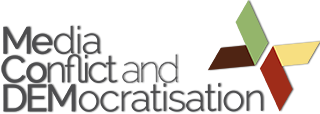A literature review by Ines Drefs and Barbara Thomass on findings about media assistance organisations is now available.
Download at: http://www.mecodem.eu/publications/working-papers
Executive Summary
This literature review provides a systematic overview of findings on media assistance in the fields of journalism training, civil society support, and good governance. It covers both academic accounts as well as “grey literature” from media assistance organisations (MAOs), democracy development organisations (DDOs), or public bodies in order to shed light on approaches, goals, and measures in media development practice. The literature review identifies concrete reference points for future research activities towards developing an understanding of modern-day capacity building for journalists, activists and governments in conflict arenas.
- The reviewed literature differentiates between linear and relational approaches to development as regards overall trends in development cooperation. Today, conceptualisations of development as a linear process of cause and effect have widely been replaced by relational approaches which emphasize local expertise and the contexts and complexities of social change.
- The literature emphasizes the importance of accounting for specific needs when it comes to media assistance in conflict-ridden contexts. The reviewed recommendations boil down to establishing communication between different actors (such as oppositional players or media and public professionals) and to institutionalising this communication in the form of round-tables, press conferences, or other modi vivendi of dealing with one another in a democratic way.
- Two aspects are salient throughout the reviewed areas “journalism training”, “capacity building for civil society actors”, and “capacity building for political leaders”: The need for multi-stakeholder dialogue and an emphasis on creating awareness of the general value of communication.
- Differences across the reviewed areas seem rooted in the amount of practical experience gained so far with the respective group of beneficiaries. Future research is well-advised to adapt its focus accordingly. Examining “best practices” is especially relevant when it comes to journalism training. An understanding of support offered to activists can be gained by identifying specific challenges to civil society organisations. When it comes to capacity building for governments it seems especially informative to address the standing of improved communication skills within established training structures.
